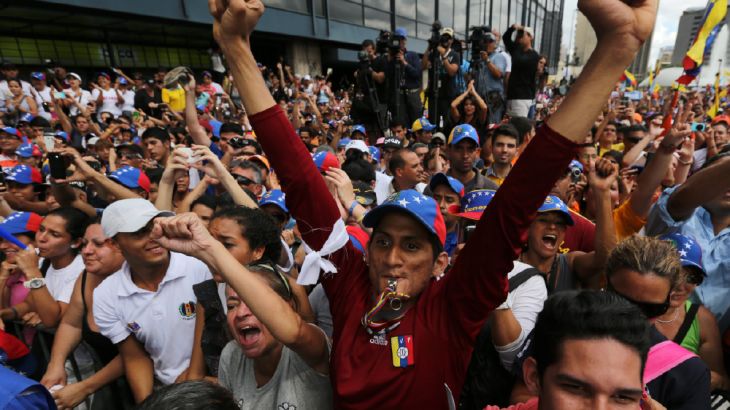Venezuela’s false dawn?
Opposition’s landslide win deals crushing blow to the ruling socialists, but President Maduro could still play spoiler.

The electoral blow was obviously too traumatic for the government: the opposition won control of National Assembly by a landslide, delivering a major setback to the long-ruling socialists.
Only that can explain why Venezuela’s National Electoral Council – whose president is loyal to the government – revealed results of Sunday’s elections very slowly.
So slowly that even though the votes had long been counted, it took until Tuesday night for the electoral body to post the results on its website.
|
|
Not even in their worst dreams could government supporters have imagined the opposition winning a two-third majority.
No amount of appealing for loyalty to the legacy of deceased leftist leader Hugo Chavez – who launched the Bolivarian Revolution 17 years ago – could stop Venezuelans from punishing their government with their votes.
Even in Caracas’ once most-revolutionary neighbourhood, 23 de Enero, people overwhelmingly voted for the opposition.
A year ago, that would have been unthinkable.
But chronic shortage of basic goods including medicine; triple-digit inflation; and runaway crime and corruption have turned millions of Venezuelans, who had always voted for Chavez, against his successor Nicolas Maduro.
Two days after suffering the most devastating election defeat in the populist revolution’s history, Maduro called for his ministers to resign.
He anticipated a major shake-up to revert what he himself recognised as “a slap in the face” from the Venezuelan people who gave “a victory to the counter-revolution”.
How he plans to stop Venezuela’s economic meltdown remains unclear.
Rather than extending an olive branch to the opposition to confront the country’s economic and social crisis, Maduro has insisted on his Socialist model “at all costs”.
In Pictures: Venezuela opposition celebrates poll victory
The opposition takes over the National Assembly on January 5 and will have enough votes to name the legislature’s president, set the agenda, name magistrates, remove ministers, approve or reject the government’s budget, repeal key laws passed by the government, and even call for a recall referendum to oust the president.
But opposition leaders say their first priority will be to rescue the economy and pass an amnesty law to release jailed politicians regarded as political prisoners, including Leopoldo Lopez and Antonio Ledesma, the Caracas mayor.
But the ruling party, which has had complete control over all state institutions, still has three weeks to pass the laws.

Maduro could ask the current legislature to approve super powers for up to three years which would allow him to pass laws by decree.
President Chavez was the first to do it and his successor has followed suit.
On Tuesday Diosdado Cabello, the current National Assembly president, announced he was handing over ownership of the National Assembly Television and Radio Networks to its workers immediately.
The idea was to deprive the opposition of a key mass-media outlet.
Asked if he feared being impeached, Maduro said: “We have to be prepared for new battles and new victories. We will create a new and powerful majority and I am prepared for whatever comes, if they come after us.”
“Let’s not make a melodrama out of this,” he said while repeating claims that the nation was suffering from an economic war waged by internal and external enemies.
“Let’s not panic. Relax. Let’s see what went wrong and let’s fix it. I will radicalise the revolution. I will only dialogue with the men and women on the streets.”
Millions of Venezuelans, who had hoped that the government would negotiate with the opposition-dominated legislature and seek a consensus to confront the nation’s acute problems, are set to be disappointed.